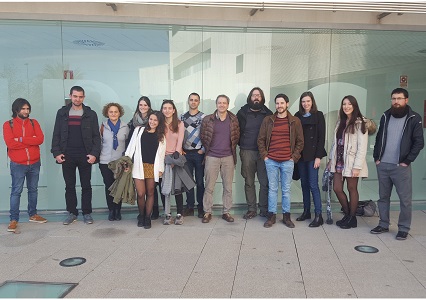Users
Social media
- More details here...
- Address
Parc Científic de la Universitat de València C/
Catedrático Agustín Escardino, 9
46980 Paterna (Valencia) Spain - Email:
iu.i2sysbio@uv.es - Phone:
(+34) 963544810
- Address
Links
A genetic study characterizes the dynamics of HIV transmission in the Valencian Community
Investigation
14-09-2017
A genetic study characterizes the dynamics of HIV transmission in the Valencian Community
A study in which the University of Valencia, different hospitals, FISABIO and the Carlos III Health Institute have participated has characterized in the area of the Valencian Community which are the main types of the Human Immunodeficiency Virus (HIV) that exist, as well as which are the main risk groups of the infection epidemic. The work has been published today in the journal 'Scientific Reports' and is based on samples obtained between 2004 and 2014 in Valencian hospitals and UPSI.

“The majority of the cases studied correspond to groups or chains of transmission in the Valencian Community itself, a fact that demonstrates the importance of local transmissions,” highlighted Fernando González, professor of Genetics at the University of Valencia, coordinator of the work and researcher at FISABIO (Foundation for the Promotion of Health and Biomedical Research in the Valencian Community).
The research shows that 57% of the infections correspond to transmission groups in the Valencian Community and in which infections predominate in men of Spanish origin who have unprotected sexual relations with men. Furthermore, it is shown that the non-B subtypes described in the Valencian area mainly affect heterosexual people and people of foreign origin. Also, although with a lower incidence, among people affected by subtype B there are users of drugs administered intravenously.
In addition, the study also describes a sustained increase in non-B type infections (more than 15%), as a consequence of flows of people, such as immigration and tourism, which have also been previously confirmed in other regions of Spain such as the Community of Madrid. Regarding HIV type B, in accordance with existing data at the European level, it is also prevalent in most Western countries. For this reason, this is the most studied type and for which the mutations of the virus that can cause resistance to antiretroviral drugs are best known.
The novelty provided by this study, "The molecular epidemiology of HIV-1 in the Valencian Community (Spain): analysis of transmission clusters", is that it has been carried out based on the analysis of the genetic information of the virus from 1,804 samples contained in six hospitals and UPSIs (AIDS and other STI Prevention Units), unlike other jobs based on interviews. The samples have been generated in a period ranging from the mid-2000s to the beginning of 2014.
This methodology aims to design the best antiviral therapy for each infected person and is combined with epidemiological and clinical data within an epidemiological surveillance program of HIV infection, seeking a more detailed and precise characterization of the HIV epidemic in the Valencian Community.
This research is relevant, according to Fernando González, “because of the higher resolution and detail that it contributes to the surveillance of infection by the virus, describing and quantifying the existence of groups of transmission of the virus, and allows the design and implementation of information and control programs aimed at groups most exposed to infections. The work also emphasizes that the results obtained “must be useful to establish and reinforce preventive measures in certain risk groups.”
Research
This research has been funded by the Ministries of Economy and Competitiveness, Health and Consumer Affairs, and the Ministry of Culture and Sports, in addition to the PROMETEO program (Generalitat Valenciana) for research groups of excellence.
Article:
Patiño-Galindo et al. (2017) «The molecular epidemiology of HIV-1 in the Valencian Community (Spain): analysis of transmission clusters». Sci. Rep. 7, 11584. (http://www.nature.com/articles/s41598-017-10286-1)
Cover and gallery photo caption:
Fernando González Candelas, professor of Genetics at the University of Valencia and researcher at FISABIO. Photo: Mila Martínez (FISABIO)
Images:




